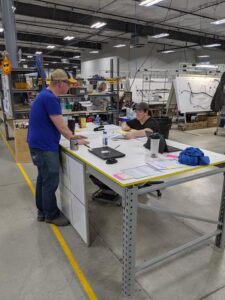
Timberline Manufacturing faced a difficult challenge. The Marion-based electronics contract manufacturer, like many employers in today’s economy, struggled to find assembly-line employees for its wire harness department. As a solution, they began exploring ways to augment their current workforce putting together the harnesses, which organize and protect electrical wires.
Wire harnesses are just one of the diverse product offerings of Timberline, but they are labor intensive, accounting for 60 percent of the workforce but generating more than 30 percent of the company’s revenue.
The company took the initial steps to research automation options. However, the employee who had been leading the effort left the company, putting the project in limbo. Simply hiring a new employee or contractor to wrap it up wouldn’t be easy. Partly finished projects can be the toughest for someone to jump in and complete because figuring out exactly where the project manager left off and deciphering notes is, in some ways, more challenging than starting from scratch.
Fortunately, Timberline’s Jim Kivell, director of operational excellence, had already built a relationship with CIRAS. He knew that the end goal of CIRAS was to help Iowa companies succeed, so he reached out.
CIRAS project managers Ty Hill and Emily Betz stepped in. The CIRAS team conducted time studies to assess the potential return on investment for automating the harness process. They thoroughly investigated and proposed several automation alternatives. Then, they reached out to potential contractors to solicit bids.
“They had the bandwidth and the experience to put it all together,” Kivell said.
Also helping the project was a Manufacturing 4.0 grant that Timberline received from the Iowa Economic Development Authority.
Hill says, “I’m glad Timberline reached out because, too often, companies don’t realize that CIRAS can step in at any stage of the project and be of assistance and get it over the finish line.”
Ultimately, Timberline selected the automation provider they believed was most suitable. Kivell said their confidence in their decision was significantly bolstered by the thorough evaluation process conducted in collaboration with CIRAS. “We were able to de-risk technology adoption for Timberline,” Hill explained. “Even in a case where they may have potential solutions identified, we can consult with companies to make sure they’re truly the best choice.”
For more information, contact Ty Hill at tyhill@iastate.edu or 515-357-4379.